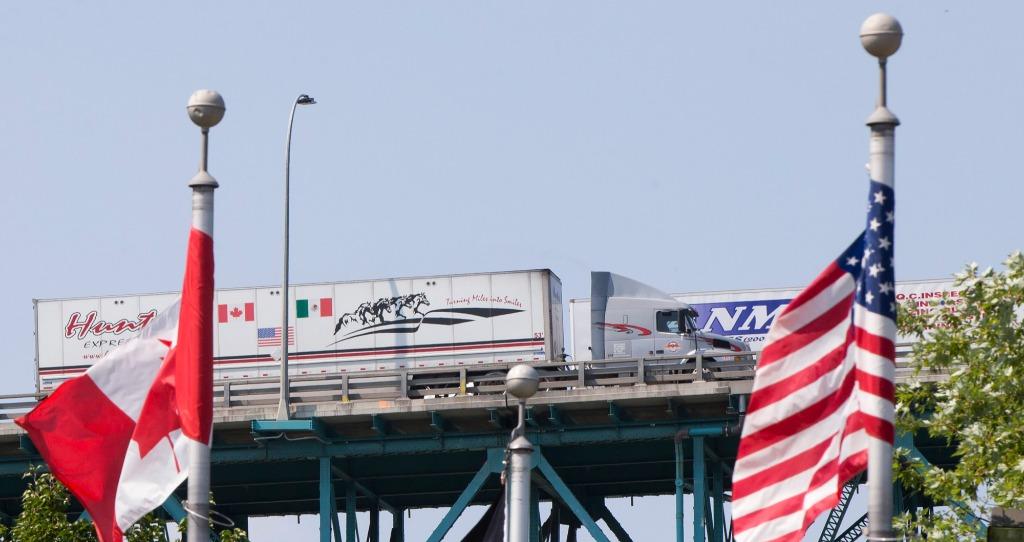Beijing, February 10 (Xinhua) -- Protests in Ottawa, canada' capital, continued to spill over, with demonstrators blocking the largest trade channel between Canada and the United States for several consecutive days, and a number of companies said on the 9th that production activities were affected.
Canadian Prime Minister Justin Trudeau criticized the protests as "unacceptable" on the same day and insisted on opposing the relaxation of Canada's COVID-19 prevention restrictions.
Business operations are blocked
According to the Associated Press, as of the 9th, truck drivers who held protests have blocked the Ambassador Bridge between The Canadian city of Windsor, Ontario, and Detroit, Michigan, for three consecutive days.

A long-distance van (left) bearing the flags of Mexico, Canada, travels to the United States via the Ambassadors Bridge in Windsor, Ontario, Canada, on August 16, 2017. (Xinhua News Agency, photo by Zou Zheng)
The suspension bridge is the largest land trade route between Canada and the United States. The bridge's lane towards the United States resumed traffic on the 8th, and the lane into Canada remained closed.
Ford Motor Company said later on the 9th that the transportation disruption led to a shortage of spare parts, and the company was forced to close its engine plant in Windsor and shorten the working hours of an assembly plant in Oakville, Ontario.
"The disruption of the bridge (traffic) between the city of Detroit and Windsor is detrimental to customers, auto workers, suppliers, communities and businesses on both sides of the border," Ford said in a statement, "and we hope this situation can be resolved quickly because it could have wide-ranging implications for all automakers in the United States and Canada." ”
On August 16, 2017, in Windsor, Ontario, Canada, a long-distance truck sailed across the Ambassador Bridge to the United States. (Xinhua News Agency, photo by Zou Zheng)
A spokesman for Toyota Motor North America said on the same day that the company's three plants in Canada could not carry out any production activities for the rest of the week due to a shortage of parts. Some plants of General Motors and Strantis were also affected.
Police said the demonstration at Ambassadors Bridge involved between 50 and 74 cars and about 100 demonstrators.
Windsor Mayor Drew Dirkkens said police did not drive away the demonstrators for fear of intensifying the situation, but "we will not allow this to continue for long"
In addition, demonstrators continued to block the cross-border passage between Coutis, Alberta, Canada, and the United States, and about 50 trucks stayed here on the 9th.
The protests were sparked by new anti-epidemic regulations announced by the Canadian government in mid-January. The government requires truck drivers travelling between Canada and the United States to produce proof of COVID-19 vaccination when entering the United States. The U.S. side introduced a similar move a few days later. A large number of Canadian and American truck drivers oppose the new rules. Demonstrators began marching into Ottawa in late January under the banner of a "free motorcade" to protest.
Ottawa Mayor Jim Watson declared a state of emergency on the 6th, saying that the demonstrations had gotten out of control.
Trudeau is uncompromising
According to the Associated Press, in view of the flattening of the spread of the mutant new coronavirus Amickron strain, more and more provinces in Canada have begun to cancel some epidemic prevention measures, but Prime Minister Trudeau has insisted on easing the measures introduced by the federal government.
"The blockade, illegal demonstrations are unacceptable and are having a negative impact on businesses and manufacturers," Trudeau said in a speech in the House of Commons on the 9th, "We must do everything we can to end them." ”
On July 10, 2018, in the Latvian capital Riga, Canadian Prime Minister Trudeau attended a joint press conference with Latvian Prime Minister Kuczynskis. (Xinhua News Agency, photo by Yannis)
He told demonstrators that ending the outbreak requires scientific measures such as public health measures, not demonstrations, and that Canada's high COVID-19 vaccination rates ensure that the country is protected from the severe blow of the epidemic.
Ottawa police warned demonstrators on the 9th that if they continue to "illegally" block the streets of the city center, they may face criminal charges, and the demonstrators' trucks may be seized.
Bank of Canada Governor Tiff McClem called for a speedy solution.
"If key entry points into Canada are blocked for a long time, it will have a significant impact on economic activity," he said, "and global supply chains are already tight and we don't need that." ”
Canadian Public Safety Minister Marco Mendisino similarly warned of "serious danger to the economy", calling on demonstrators to "go home!" ”
The White House said on the 9th that the demonstrations led to the obstruction of ports in the United States and Canada, which in turn may damage the automobile industry and agriculture.
White House spokeswoman Jane Psaki said on the same day that the United States and Canada were engaged in "very close contact" over the blockade of the Ambassadors Bridge. (Liu Xi)